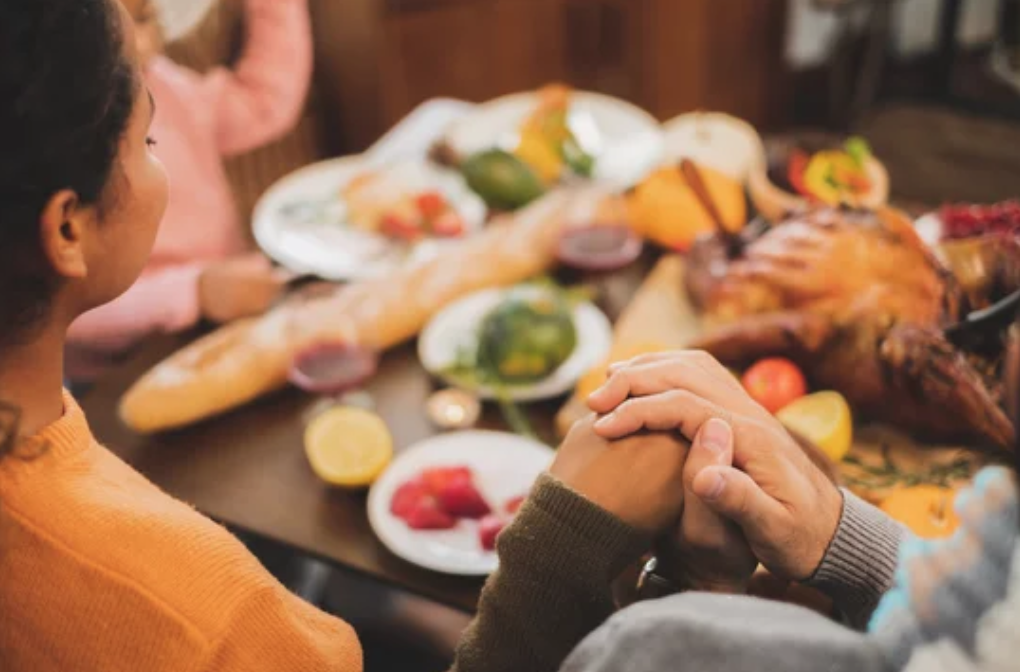
This year’s Thanksgiving holiday features one enormous difference from last year’s:
Vaccinations.
Fortunately, the Covid-19 vaccine became available earlier this year, and by now, about half of Georgians have received the shots.
Vaccinations have significantly lightened the mood around the country in regard to the virus, though Covid cases have begun to rise again.
Two-thirds of Americans plan to see family or friends from outside of their household for Thanksgiving, regardless of vaccination status, according to this week’s Axios-Ipsos Coronavirus Index.

Credit: Kaiser Health News
Less than a third (31%) consider seeing friends or family for Thanksgiving as a large/moderate risk, compared to 64% this time last year, the poll found.
The nation’s top infectious disease expert has weighed in the new, less dangerous climate.
If you and your family members are fully vaccinated against Covid-19, it’s OK for you to ditch the masks this holiday season when you’re around each other, Dr. Anthony Fauci told CNN Sunday.
But Fauci also said that if you are traveling or are unaware of the vaccination status of the people around you, then you should wear a mask in those situations.
Still, there are many families navigating tough personal decisions around the topic of vaccines.
A recent survey by the Harris Poll found that 42% of vaccinated respondents had canceled at least one event or travel plan they had with people because they weren’t inoculated, the Los Angeles Times reported. The Times article also said that in a recent discussion on Twitter about banning unvaccinated relatives from holiday gatherings, several people declared themselves staunchly “no vax, no snax.”

Fauci
For those planning a Thanksgiving gathering, experts advise that when it comes to people with young children not yet eligible for the vaccine, you can reduce the risk by making sure those around the kids are vaccinated.
Also, if you’re in public indoor places and not vaccinated fully, wear a well-fitting mask over your nose and mouth, according to the CDC and the Georgia Department of Public Health. People who are fully vaccinated should wear a mask in public indoor settings in communities with substantial to high Covid transmission.
Other tips include:
- Wash your hands frequently with soap and warm water. Use hand sanitizer if soap and water aren’t available.
- If you are sick or have symptoms of Covid-19 or the flu, don’t host or attend a holiday gathering.
- Get tested if you have symptoms of Covid-19 or have had close contact with someone who has the virus.
- If you are not fully vaccinated for Covid and must travel, follow the CDC’s recommendations.
How about the bird?
For those of you, like me, who plan to fry a turkey for Thanksgiving, here are some safety tips from experts (I don’t count myself one, though it’s a family tradition).
On the safety checklist is setting up the fryer far enough away from the house. Another big safety reminder is making sure that the turkey isn’t frozen when it descends into bubbling peanut oil.
But there are plenty of other potential pitfalls. Thanksgiving is the peak day for home cooking fires, followed by Christmas Day and Christmas Eve.
 The University of Georgia College of Agricultural and Environmental Sciences points out that some of the most serious injuries are caused by faulty or misused equipment, like unstable fryer stands, uninsulated pot handles and/or fry pots that have been overfilled with oil.
The University of Georgia College of Agricultural and Environmental Sciences points out that some of the most serious injuries are caused by faulty or misused equipment, like unstable fryer stands, uninsulated pot handles and/or fry pots that have been overfilled with oil.
Filling the pot too full of oil can cause the oil to spill over when the turkey is placed in the pot. In addition to creating an oily mess, spillovers at cooking temperatures can cause severe burns.
Whole turkeys require about 3 minutes per pound to cook. To be sure your bird is safely cooked, the temperature must reach at least 165 degrees in the thickest part of the breast. Some cooks prefer the innermost part of the thigh to reach 180 degrees.
You may be nervous about lowering a 12-pound turkey into 8 gallons of bubbling oil in a pot suspended over an open propane flame. That’s understandable. Fortunately, there are now electric fryers available that take some of this guesswork out of the process.






